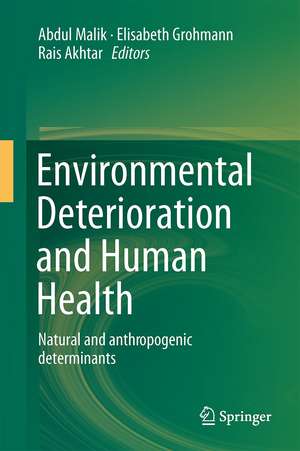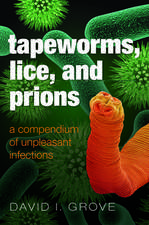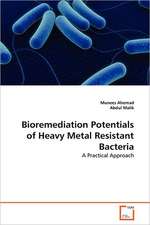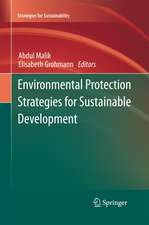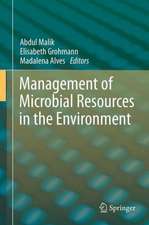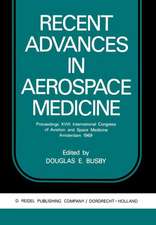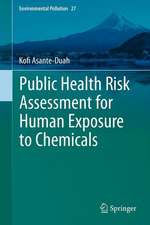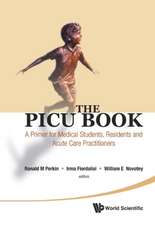Environmental Deterioration and Human Health: Natural and anthropogenic determinants
Editat de Abdul Malik, Elisabeth Grohmann, Rais Akhtaren Limba Engleză Hardback – 27 dec 2013
| Toate formatele și edițiile | Preț | Express |
|---|---|---|
| Paperback (1) | 723.57 lei 6-8 săpt. | |
| SPRINGER NETHERLANDS – 17 sep 2016 | 723.57 lei 6-8 săpt. | |
| Hardback (1) | 730.71 lei 6-8 săpt. | |
| SPRINGER NETHERLANDS – 27 dec 2013 | 730.71 lei 6-8 săpt. |
Preț: 730.71 lei
Preț vechi: 769.17 lei
-5% Nou
Puncte Express: 1096
Preț estimativ în valută:
139.81€ • 145.99$ • 115.46£
139.81€ • 145.99$ • 115.46£
Carte tipărită la comandă
Livrare economică 15-29 aprilie
Preluare comenzi: 021 569.72.76
Specificații
ISBN-13: 9789400778894
ISBN-10: 9400778899
Pagini: 440
Ilustrații: XV, 421 p. 45 illus., 35 illus. in color.
Dimensiuni: 155 x 235 x 32 mm
Greutate: 0.79 kg
Ediția:2014
Editura: SPRINGER NETHERLANDS
Colecția Springer
Locul publicării:Dordrecht, Netherlands
ISBN-10: 9400778899
Pagini: 440
Ilustrații: XV, 421 p. 45 illus., 35 illus. in color.
Dimensiuni: 155 x 235 x 32 mm
Greutate: 0.79 kg
Ediția:2014
Editura: SPRINGER NETHERLANDS
Colecția Springer
Locul publicării:Dordrecht, Netherlands
Public țintă
ResearchCuprins
Part I: Environmental Quality Deterioration and Health.- Part II: Pollution and Health.- Part III: Climate Change and Health.- Part IV Water Quality, Exposure and Health.
Notă biografică
Abdul Malik is Associate Professor and Former Chairman (Head), Department of Agricultural Microbiology. He has been awarded several International fellowships, awards and honors including DBT CREST, DAAD fellowship (Germany), BOYSCAST overseas fellowship, Jawahar Lal Nehru Memorial Fund award etc. He has collaborative project with TU Berlin and University of Minho, Braga, Portugal. He has received research grants from several funding agencies of the Govt. of India including DST, CSIR, UGC as Principal Investigator. Dr. Malik has published a number of research papers in leading scientific journals of the world and edited Five books published by the leading international Publishers. His major areas of Research are Environmental Microbiology, Ecotoxicology, and Agricultural Microbiology.
Elisabeth Grohmann is Professor at the Institute of Biology, Section Microbiology, at Albert-Ludwigs-University Freiburg, Germany. She received her Ph.D. in Biochemistry and Molecular Biology from Technical University, Graz, Austria. In 2003 she completed her habilitation (Venia legendi) in Molecular Biology at the Institute of Environmental Engineering, Technical University Berlin, Germany. Her research focuses on conjugative plasmids and the elucidation of the antibiotic resistance transfer mechanism.
Rais Akhtar is Adjunct Professor at the International Institute of Health Management and Research, New Delhi. Formerly Professor of Geography, University of Kashmir, Srinagar, National Fellow, ICSSR, and Emeritus Scientist, CSIR, in Geography, JNU, New Delhi, India. Recipient of a number of international fellowships like Leverhulme Fellowship (University of Liverpool), Henry Chapman Fellowship etc (University of London), and Visiting Professor University of Paris. His major thrust areas of research are Environment and health and sustainable development with focus on climate change and health scenario.
Elisabeth Grohmann is Professor at the Institute of Biology, Section Microbiology, at Albert-Ludwigs-University Freiburg, Germany. She received her Ph.D. in Biochemistry and Molecular Biology from Technical University, Graz, Austria. In 2003 she completed her habilitation (Venia legendi) in Molecular Biology at the Institute of Environmental Engineering, Technical University Berlin, Germany. Her research focuses on conjugative plasmids and the elucidation of the antibiotic resistance transfer mechanism.
Rais Akhtar is Adjunct Professor at the International Institute of Health Management and Research, New Delhi. Formerly Professor of Geography, University of Kashmir, Srinagar, National Fellow, ICSSR, and Emeritus Scientist, CSIR, in Geography, JNU, New Delhi, India. Recipient of a number of international fellowships like Leverhulme Fellowship (University of Liverpool), Henry Chapman Fellowship etc (University of London), and Visiting Professor University of Paris. His major thrust areas of research are Environment and health and sustainable development with focus on climate change and health scenario.
Textul de pe ultima copertă
This book discusses the natural and anthropogenic determinants of the environment and their impact on human health. It throws light on the perspectives of climate change with case studies from Australia, India, Italy, and Latin America. Themes covered are ecology of antibiotic resistant microorganisms, pesticide and heavy metal (arsenic) problems in natural environment; molecular advances in understanding of microbial interactions; ecological studies of human/animal health and diseases; food security, technological developments and more. The various chapters incorporate both theoretical and applied aspects and may serve as baseline information for future research through which significant development is possible.
Caracteristici
Discusses the natural and anthropogenic determinants of the environment and their impact on human health, climate change and other issues Focuses on the consequences of natural resource management and pollution risks, human health, climate change, food security Looks ahead by defining current bottlenecks and future research goals Includes supplementary material: sn.pub/extras
